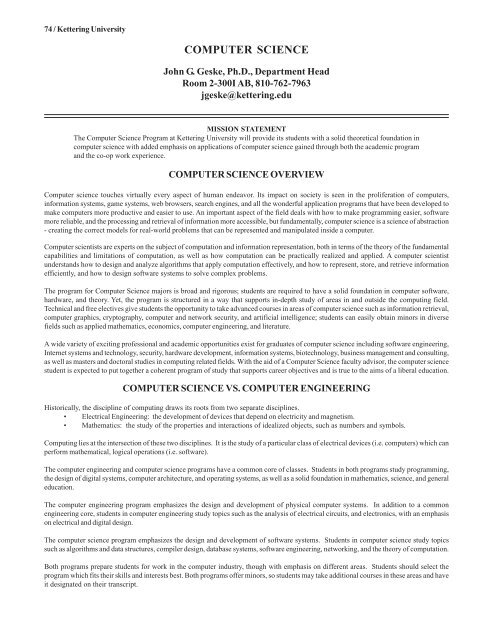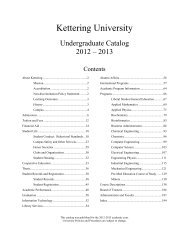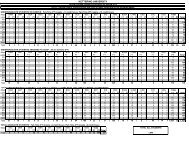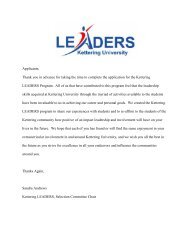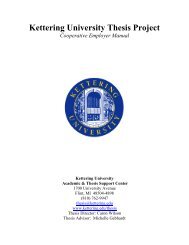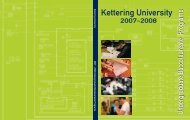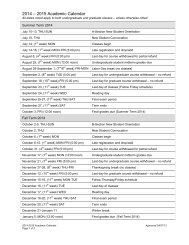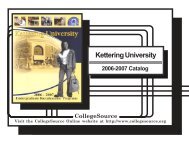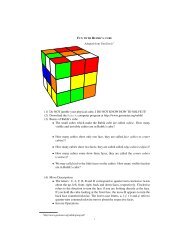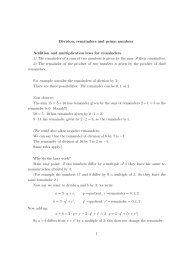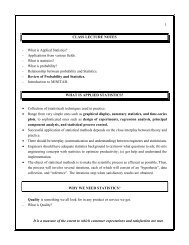2008-2009 Undergraduate Catalog - Kettering University
2008-2009 Undergraduate Catalog - Kettering University
2008-2009 Undergraduate Catalog - Kettering University
Create successful ePaper yourself
Turn your PDF publications into a flip-book with our unique Google optimized e-Paper software.
74 / <strong>Kettering</strong> <strong>University</strong><br />
COMPUTER SCIENCE<br />
John G. Geske, Ph.D., Department Head<br />
Room 2-300I AB, 810-762-7963<br />
jgeske@kettering.edu<br />
MISSION STATEMENT<br />
The Computer Science Program at <strong>Kettering</strong> <strong>University</strong> will provide its students with a solid theoretical foundation in<br />
computer science with added emphasis on applications of computer science gained through both the academic program<br />
and the co-op work experience.<br />
COMPUTER SCIENCE OVERVIEW<br />
Computer science touches virtually every aspect of human endeavor. Its impact on society is seen in the proliferation of computers,<br />
information systems, game systems, web browsers, search engines, and all the wonderful application programs that have been developed to<br />
make computers more productive and easier to use. An important aspect of the field deals with how to make programming easier, software<br />
more reliable, and the processing and retrieval of information more accessible, but fundamentally, computer science is a science of abstraction<br />
- creating the correct models for real-world problems that can be represented and manipulated inside a computer.<br />
Computer scientists are experts on the subject of computation and information representation, both in terms of the theory of the fundamental<br />
capabilities and limitations of computation, as well as how computation can be practically realized and applied. A computer scientist<br />
understands how to design and analyze algorithms that apply computation effectively, and how to represent, store, and retrieve information<br />
efficiently, and how to design software systems to solve complex problems.<br />
The program for Computer Science majors is broad and rigorous; students are required to have a solid foundation in computer software,<br />
hardware, and theory. Yet, the program is structured in a way that supports in-depth study of areas in and outside the computing field.<br />
Technical and free electives give students the opportunity to take advanced courses in areas of computer science such as information retrieval,<br />
computer graphics, cryptography, computer and network security, and artificial intelligence; students can easily obtain minors in diverse<br />
fields such as applied mathematics, economics, computer engineering, and literature.<br />
A wide variety of exciting professional and academic opportunities exist for graduates of computer science including software engineering,<br />
Internet systems and technology, security, hardware development, information systems, biotechnology, business management and consulting,<br />
as well as masters and doctoral studies in computing related fields. With the aid of a Computer Science faculty advisor, the computer science<br />
student is expected to put together a coherent program of study that supports career objectives and is true to the aims of a liberal education.<br />
COMPUTER SCIENCE VS. COMPUTER ENGINEERING<br />
Historically, the discipline of computing draws its roots from two separate disciplines.<br />
• Electrical Engineering: the development of devices that depend on electricity and magnetism.<br />
• Mathematics: the study of the properties and interactions of idealized objects, such as numbers and symbols.<br />
Computing lies at the intersection of these two disciplines. It is the study of a particular class of electrical devices (i.e. computers) which can<br />
perform mathematical, logical operations (i.e. software).<br />
The computer engineering and computer science programs have a common core of classes. Students in both programs study programming,<br />
the design of digital systems, computer architecture, and operating systems, as well as a solid foundation in mathematics, science, and general<br />
education.<br />
The computer engineering program emphasizes the design and development of physical computer systems. In addition to a common<br />
engineering core, students in computer engineering study topics such as the analysis of electrical circuits, and electronics, with an emphasis<br />
on electrical and digital design.<br />
The computer science program emphasizes the design and development of software systems. Students in computer science study topics<br />
such as algorithms and data structures, compiler design, database systems, software engineering, networking, and the theory of computation.<br />
Both programs prepare students for work in the computer industry, though with emphasis on different areas. Students should select the<br />
program which fits their skills and interests best. Both programs offer minors, so students may take additional courses in these areas and have<br />
it designated on their transcript.


